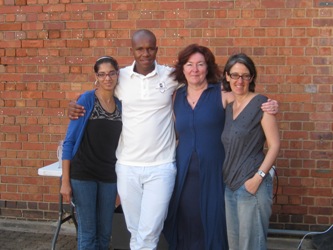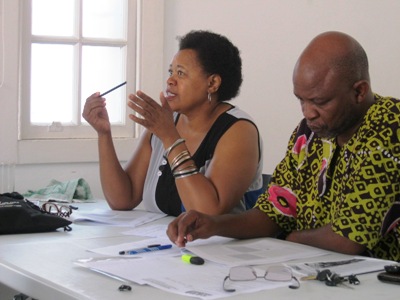|
23 February 2016
REPORT BACK: Using SS Mendi to consider the teaching of war
As part of the ongoing SAHA in the classroom workshop series for history educators, SAHA hosted a workshop on teaching (about) war, using the tragedy of the sinking of the SS Mendi during World War 1 as a case study. The workshop was hosted on Saturday 20 February and facilitated by Siobhan Glanvill. This was a day before the 99th anniversary of the sinking of the SS Mendi on 21 February 1917 where 616 South Africans lost their lives.

The educators who joined for the workshop were mostly high school teachers with one junior school teacher. Siobhan Glanvill started out by situating the SS Mendi within the CAPS curriculum and how it is often skimmed over firstly due to the time constraints and challenges of sticking to the department schedules. The other reason is that history textbooks often give only a paragraph or two on this event. It is for this reason that SAHA produced publication Drilling the Death Drill: The sinking of the SS Mendi for educators to use when teaching about war. Working through this resource pack allowed educators to unpack ideas to share with their students.
During the course of the workshop, the educators were questioned about what they knew of South Africa’s role in WW1. It was revealed that those attending knew little of what South Africa or Africa’s part in the war effort was and knows more of England, Germany and France’s war history. This illustrated the very Eurocentric nature of teaching of the war which is still in effect.The documentary Let us die like brothers by the Commonwealth War Graves Commission in collaboration with the History Channel was shown to tell the story of the sinking of the Mendi.

The SS Mendi offers as a case study many ways for students to cultivate their historical thinking. There is the opportunity here to engage with reliability of sources and oral histories? Did the famous speech by Reverend Isaac Wauchope Dyobha happen? This speaks to oral histories and the importance of collective memory in recording of histories in the South African context. The way that this event was managed by the Union Government at the time gives insight into their thinking. Siobhan Glanvill also showed how no narrative is completely clean cut and there are many complexities present even in the sinking of the SS Mendi.
Siobhan Glanvill shared an experience teaching this material with her education students. “Native Core” volunteer’s families were not directly notified of the manner and nature of their family members’ deaths. So there are still families who do not know what happened to the young men who went off to war. It turned out that one of her students saw the SS Mendi Documentary and recognized the name of one of his community members who had gone to war and never been heard of since. The young man organized a viewing of the documentary for his community so they could know what had happened. This shows the importance and relevance of educating students about this event.
There has been a change in the teaching of history to try and teach students to be more analytical and questioning of the materials they are given. This process of enquiry can be a challenge to students who often take what is given in the text book as truth. The case study of the SS Mendi gives the opportunity to engage in an event which extends history beyond the textbook.
News article on SS Mendi (IOL, 21 February 2016)
SAHA and Sunday Times heritage Project Collection of materials on the SS Mendi (SAHA Collection AL3282_E1.27)
Extract of Let us die like brothers film available on youtube |








